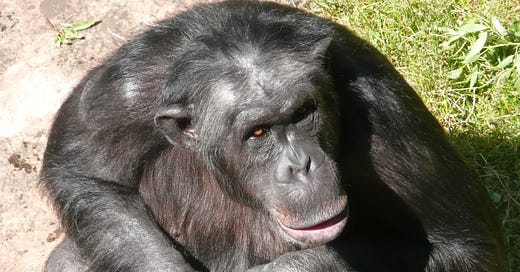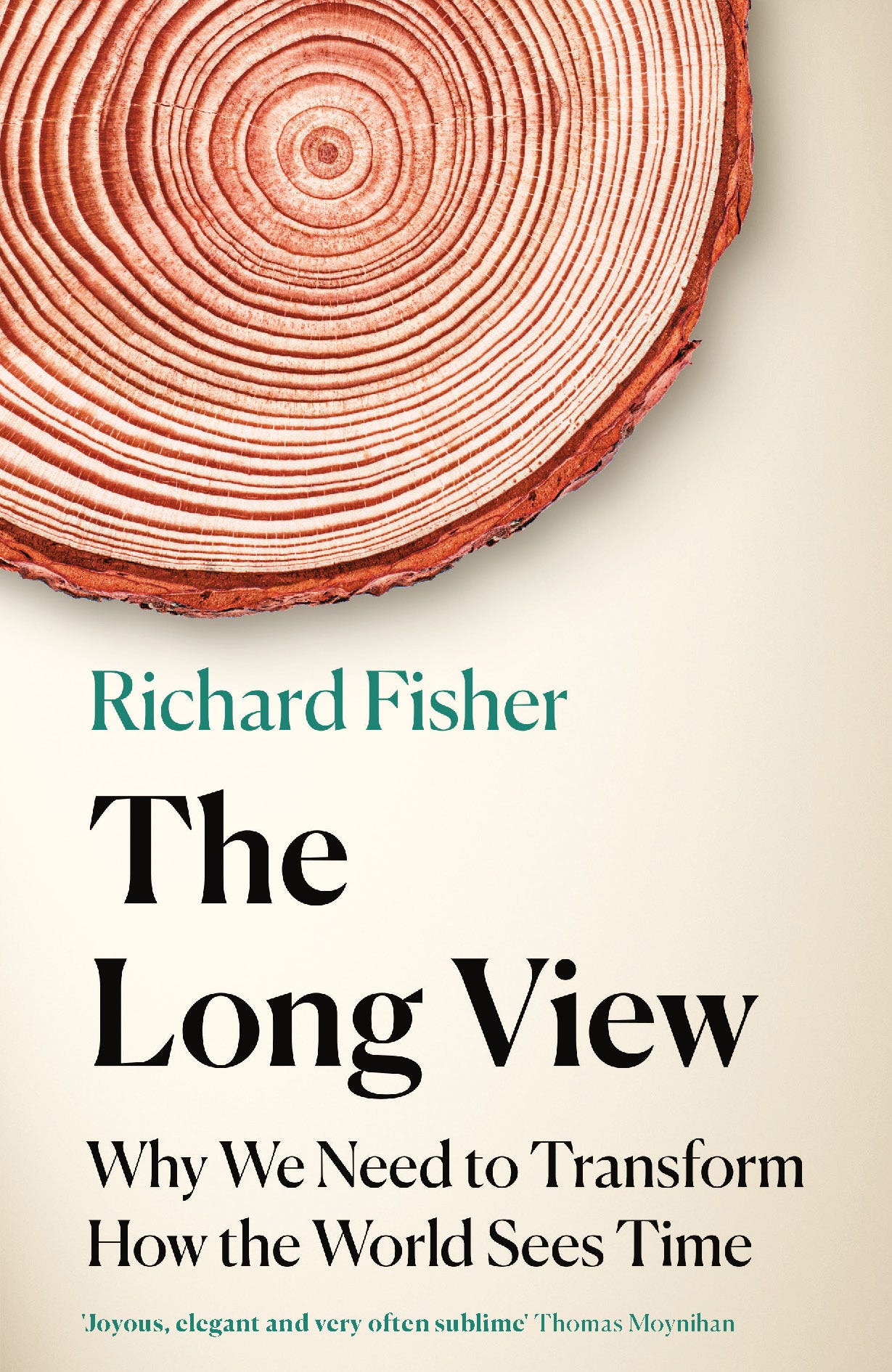You’re reading The Long View: A Field Guide, a newsletter about long-term thinking. This edition is about a “time-travelling” chimpanzee, and the sublime scale of deep time.
Last week in Sweden, a group of chimpanzees escaped from their enclosure at Furuvik Zoo. Officials feared the roaming animals might attack staff, so three of them were shot dead. Since then, many people have questioned whether killing the animals was necessary. It’s all very sad.
Particularly so because one of them, called Santino, was rather special to science, with an ability rarely observed in a non-human animal. I write about his story in my upcoming book, The Long View.
Santino’s talent emerged in the 1990s, when zookeepers noticed something odd about his behaviour. He was collecting rocks and materials from around his enclosure, which he’d then place in little piles out of view. He was very methodical: when the zoo was closed, his keepers watched him knocking on the weak parts of concrete walls to detach extra fragments. Over the years, they found hundreds of his caches.
Why was he doing it? The answer became clear when the zoo opened, and people assembled in the spectator area next to his enclosure. Santino ambled over to his piles, and started hurling them as projectiles into the crowd.
This behaviour caught the eye of researcher Matthias Osvath, who wrote an initial report about Santino in 2009, and a follow-up study in 2012. What made the chimpanzee’s acts so intriguing was that it apparently displayed evidence of forward-planning.
When he was calmly collecting rocks in the morning, was he imagining the joy of chucking rocks at spectators later on? It seemed so.
This was quite a surprise to scientists. Over the past couple of decades, there’s been a lot of debate about whether animals can think beyond their present: mostly, it seems they can’t. Or at least, not with the rich and complex detail that we can create in the theatre of our minds. You and I have the ability to “mentally time-travel” to the past or future, creating detailed scenes in our heads: the memory of what you did yesterday, or the place you’re planning to visit tomorrow. It’s a skill that may have propelled our evolutionary trajectory, allowing our ancestors to make tools, farm land and build cities.
We can only infer Santino’s thoughts from his behaviour: it’s possible that some of his stone-collecting was automatic, rather than machiavellian. His case was also rare. No other chimp in captivity has done the same, nor has similar behaviour been observed in the wild. As such, he alone couldn’t settle the question of whether mental time-travel is uniquely human or not.
Still, his story showed that at least one chimpanzee’s cognitive abilities were far more sophisticated than previously assumed.
It makes it all the more tragic that his life ended with a hasty bullet, rather than a carefully planned capture. While the zoo no doubt had a procedure for escaped animals, this particular scenario clearly wasn’t accounted for.
The ability to anticipate future events is a talent that humans are lucky to have, but as the scientists Thomas Suddendorf, Jonathan Redshaw and Adam Bulley argue in their excellent new book The Invention of Tomorrow, it has always been an imperfect skill. “Much of the power of foresight,” they write, “derives from our very awareness of its limits.”
The temporal sublime
This month, I launched a new series on BBC Future called Immensities, which is about sublime experience in all its forms: a tour of all that is awe-inspiring in the modern world.
The sublime, as articulated by writers and intellectuals in the 18th Century, is the feeling of being both astonished and overwhelmed at the same time: moments where you encounter something much bigger than yourself so that "the imagination meets no check". To describe it, they used words like "terrible joy", "delightful horror" or "rude kind of magnificence".
Deep time can, of course, be sublime. When I consider how my own experiences fit into the grand arc of life on Earth, it’s awe-inspiring, but also brings with it a reminder of mortality: provoking what the German philosopher Moses Mendelssohn called a “sweet shudder”.
That can be a good thing though. As I write in my BBC Future essay to kick off the Immensities series, there are multiple benefits to feeling insignificant from time to time. Read more here:
A note on rebranding
You may have noticed that the title of this newsletter has changed. It was formerly known as The Long-termist’s Field Guide.
A couple of reasons: firstly, it makes sense to bring it more into line with the title of my upcoming book, The Long View. Second, I felt the word “long-termist” was becoming confusing, given increasing awareness of longtermism (the effective altruism version; no hyphen). I see longtermism as one of multiple possible lenses to think about long-term time, rooted in a specific philosophy and way of seeing the world. But there are other timeviews: artistic, indigenous, religious or historical perspectives, to name a few. I’ve long believed that we need pluralism in long-term thinking – after all, the future belongs to everyone – and that will continue to be the spirit of The Long View: A Field Guide.
How to pre-order my book
My book The Long View: Why We Need to Transform How the World Sees Time will be out in March 2023, and is now available to pre-order. This month, it was chosen by The Bookseller as one of their “Editor’s Picks” for March.
For UK readers, the book will be available from various different retailers… but if you have no preference, may I suggest ordering via my page on bookshop.org? Buying from this link supports UK independent bookshops, and I'll also receive a percentage of each sale. (If you’re a fellow author reading this, here’s how to set up your own Bookshop.org page for your books.)
Friends and colleagues from outside the UK have asked, how can they get a copy? I’m awaiting details of the international editions, but for now, I’d suggest the site Book Depository, which offers free worldwide delivery to many different countries, including the US.
Thanks very much for reading. I hope you have a restful holidays, and wish you all the best for the new year. See you in 2023.
best wishes,
Richard
Previous editions of The Long View: A Field Guide








An enjoyable read and a very sad story. It highlights for me the way we objectify other animals, especially in captivity - they can be attractions, they can be fascinating, but when they escape the confines of our control, that turns very quickly into violent defensiveness. I wonder how the world would be different if we changed this attitude to one of empathy and respect.
I found this substack page through your most recent article on the BBC, and I'm enjoying what you're writing! Your upcoming book looks very interesting and I'd love to read it.